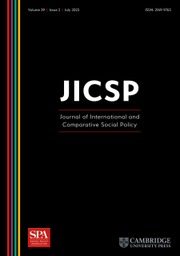Article contents
Business, as usual: the policy priorities of the World Bank's discourses on youth unemployment, and the global financial crisis
Published online by Cambridge University Press: 09 March 2020
Abstract
This article undertakes a detailed analysis of the formative role of the World Bank in the framing of youth unemployment. It charts the World Bank's emergence as a powerful political actor in this policy field and identifies the ideational content of its policy discourses on the causes of youth unemployment and responses to it. Four principal themes are identified: skills deficits; wage regulation; the “demographication” of explanations for burgeoning youth unemployment; and connections between youth unemployment, criminal activity and social disorder. The discussion highlights significant evidence of neo-liberal continuity and reinvention in World Bank discourses as its normative and ideational frameworks are extended to new terrains of analysis in ways that infer links between youth unemployment and individual deficits of the unemployed.
- Type
- Research Article
- Information
- Journal of International and Comparative Social Policy , Volume 29 , Issue 1 , February 2013 , pp. 64 - 78
- Copyright
- Copyright © 2013 Taylor & Francis
References
- 5
- Cited by


